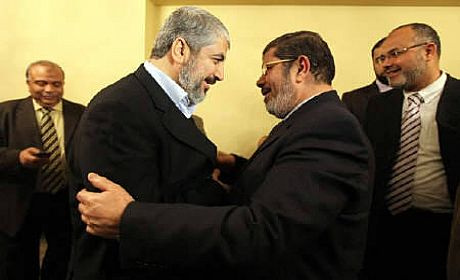Hamas Burnt All Its Bridges

There is no doubt that following the downfall of Mohammad Morsi and the Muslim Brotherhood government in Egypt, the biggest blow was dealt to the Hamas movement in Palestine. It did not take long for the happiness of Hamas supporters in Gaza following the victory of the Muslim Brotherhood in Egypt’s presidential election to be replaced by depression and concern. Hamas had the right to feel that they had lost everything after the June 30 events in Egypt and the overthrow of the Muslim Brotherhood government. During the one year presidency of Mohammad Morsi, Hamas leaders made great efforts to increase their limited capacities in Gaza and, along with the Muslim Brotherhood in Egypt, their older brother, they were ready to redefine a new capacity for the governance of the Muslim Brotherhood throughout the entire Arab World. Their first hope was the opening of the Rafah border and the pouring of their friends’ aids into the Gaza Strip, which of course never took place. Hamas considered the Muslim Brotherhood to be in line with its ideology. Following the downfall of Mohammad Morsi, it lost the hope of establishing political, social, and economic ties with Egypt. It also lost its friendship with Qatar during the transfer of power from father to son in that country. Hamas had also lost its close relations with Syria and the Islamic Republic of Iran during the past two years. Lately, it also had serious challenges with its old friend, Hezbollah. Hamas bore all these costs in order to gain a special status for itself in the domestic scene of Palestine in front of its old rival, Mahmood Abbas, and define this status beyond Gaza’s borders. But destiny did not come to Hamas’ aid.
Now, developments in the region are different. John Kerry, the US Secretary of State, after his 6 visits to the region, pursues a plan and attempts to enforce it, one side of which is Mahmood Abbas. If his efforts reach a conclusion, the controlling atmosphere against Hamas in Gaza will be more securitized and the siege of the Gaza Strip will be intensified. Therefore, the warning which Hamas leaders have given to the new government of Egypt is based on these same concerns. In fact, the reaction of the Egyptians who have accused Hamas of interfering in their internal affairs can be considered as the pre-emptive measure of the Egyptians for a more important movement, meaning a stronger siege of the Gaza Strip and preventing basic goods from reaching there through Rafah or through tunnels. Egypt and the Sinai are the most important breathing pipe and pathway for the delivery of food to more than one and a half million Palestinians in the Gaza Strip. The Hamas leaders have no choice but to interact with the new situation. This time they are forced to advance from the angle of a political and not an ideological movement which has incidentally lost its support in Cairo and whose status within Palestinian developments has been weakened.
But this is only one side of the coin. This point must also be considered that the Egyptians have always used and will continue to use Palestine and its resistance measures against Israel as a regional leverage and an element of international influence. That is why the main supporter of the Palestine dossier is the security apparatus in Egypt. Palestine has always been considered as an important card for Cairo, whether during the time of Mubarak, Morsi, or the new rulers. This time, Hamas leaders must make great efforts to show themselves as extraordinary players. They must revive their past relations with important regional parties so that they might be able to regain part of their previous status.

